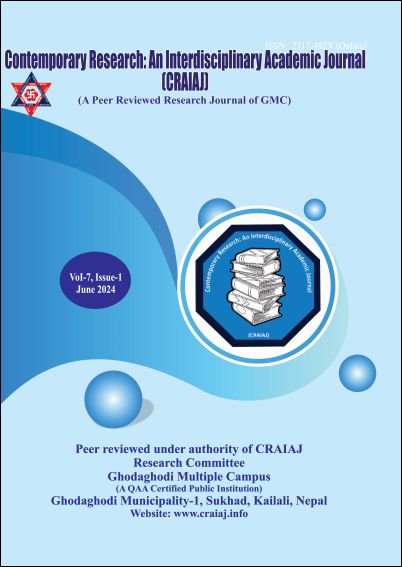The Level of Corruption in Democratic Republic of Nepal: An In-depth Analysis of Root Causes, Governance Impact, and Potential Solutions
DOI:
https://doi.org/10.3126/craiaj.v7i1.67252Keywords:
Causes of corruption, Corruption, Governance, NepalAbstract
This article critically examines the issue of corruption in Nepal's modern democracy, which poses a significant challenge to the foundational principles of transparency, accountability, and fair representation. Through an exploration of the root causes, impact on governance, and potential solutions, the study sheds light on the complexities of corruption within Nepal's political and administrative systems.
The analysis identifies historical factors, including the lingering effects of past autocratic regimes and political instability, as contributors to the conducive environment for corruption. Furthermore, weak institutional frameworks, characterized by insufficient checks and balances, inadequate enforcement mechanisms, and political patronage networks, are identified as systemic issues fostering corrupt practices.
The impact of corruption on governance is manifested in the erosion of public trust, economic consequences leading to resource misallocation, and impaired service delivery in essential sectors. These consequences collectively contribute to disillusionment among citizens, hindering the democratic process and perpetuating social inequalities.
This study utilizes qualitative methods to analyze corruption in Nepal's democracy, identifying root causes and impacts while proposing solutions like strengthening institutions and fostering transparency. Secondary research study was performed to abstract potential solutions, emphasizing the need for strengthening democratic institutions, promoting transparency and accountability through robust measures and enforcement of anti-corruption laws, and fostering citizen engagement. Additionally, international cooperation is highlighted as a valuable avenue for sharing best practices and gaining insights from successful anti-corruption efforts in other nations.
In conclusion, the study advocates for a comprehensive, multi-faceted approach to address corruption in Nepal's democracy. By addressing root causes and fostering a culture of accountability, the nation can strive towards building a more resilient democratic system that effectively serves the interests of its people. The article underscores the importance of sustained efforts and a collective commitment to combating corruption for Nepal to realize a future where democracy thrives and fulfills its promises.
Downloads
Downloads
Published
How to Cite
Issue
Section
License
Copyright (c) 2024 Ghodaghodi Multiple Campus, CRAIAJ

This work is licensed under a Creative Commons Attribution-NonCommercial-NoDerivatives 4.0 International License.
© Ghodaghodi Multiple Campus, Research Committee, RMC

This work is licensed under a Creative Commons Attribution-NonCommercial-NoDerivatives 4.0 International License. This license enables reusers to copy and distribute the material in any medium or format in unadapted form only, for noncommercial purposes only, and only so long as attribution is given to the creator.




